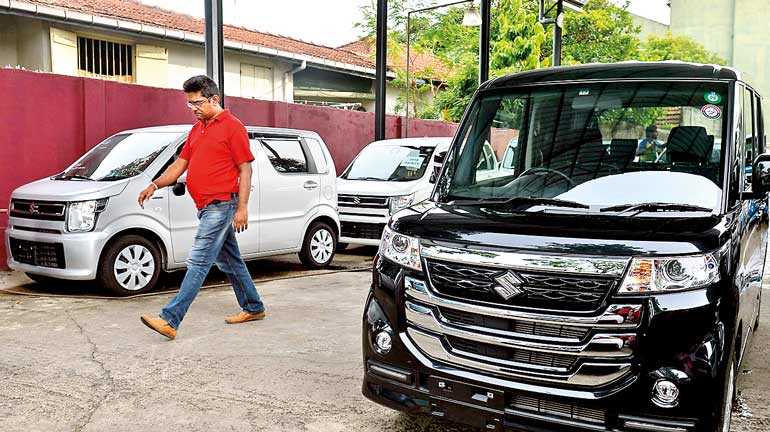Friday Feb 27, 2026
Friday Feb 27, 2026
Thursday, 2 August 2018 00:00 - - {{hitsCtrl.values.hits}}
 A Sri Lankan man walks past a car dealership selling Suzuki hybrid models in Colombo on August 1, 2018. Sri Lanka on August 1 sharply increased customs duties on imports of the top-selling Japanese hybrid car, in an apparent shift in its policy of encouraging greener vehicles - AFP
A Sri Lankan man walks past a car dealership selling Suzuki hybrid models in Colombo on August 1, 2018. Sri Lanka on August 1 sharply increased customs duties on imports of the top-selling Japanese hybrid car, in an apparent shift in its policy of encouraging greener vehicles - AFP
The Finance Ministry yesterday revised upwards the excise duty levied on vehicles with engine capacity less than 1000cc, to control the heavy outflow of foreign exchange.
Accordingly, the duty on vehicles with less than 1000cc engine capacity has been increased to Rs.1.5 million, while slapping a Rs.1.25 million duty on hybrid and electric vehicles with less than 1000cc engine capacity.
The Finance Ministry, issuing a statement, said that these tax amendments would not, however, affect the letters of credit (LCs) opened before 1 August 2018, and that these new taxes are not applicable for vehicles cleared before 31January 2019.
It was noted that the Government’s decision to revise taxes on small cars was an upshot of the heavy outflow of foreign exchange observed in the recent past.
“The decision to revise tax structure came into light after monitoring the heavy outflow of foreign exchange to import small cars, particularly small hybrid cars below 1000cc, while also considering the rising fuel importation cost. In addition, the authorities also felt due to high influx of vehicles, it caused heavy traffic within main city limits,” a top official from the Treasury told the Daily FT.
Referring to the statistics regarding imported goods to the country, he said motor vehicles ranked number two, after fuel imports.
Vehicle Importers Association of Sri Lanka (VIASL) Chairman Ranjan Peiris noted that the price of petrol vehicles with engine capacity less than1000cc would be increased by Rs.350,000, while electric and hybrid vehicles below 1000cc engine capacity would be increased by Rs.415,000.
“Hybrid vehicles such as Suzuki Hustler, Suzuki Wagon R, Suzuki SpaciaC vehicles will be increased. Petrol vehicles below 1000 cc including Suzuki Alto (Japan), Daihatsu Mira, Honda N-BOX, Honda N WGN (Wagon), Nissan Dayz and Toyota Pixis Epoch would be increased,” he said.
Considering the current market condition, he said the prices of the vehicles will start to increase from mid-September, thus advising any potential buyers to place their LCs as soon as possible.
An AFP report said according to the latest data, out of 5,190 new cars registered in the country in April, more than half (2,619) were the small hybrid Suzuki models.
Only last November the Government reduced duties on electric and hybrid cars as part of its plans to phase out fossil fuel vehicles by 2040 in the island nation of 21 million people.
The new announcement came as the central bank warned that car imports had inflated the trade deficit by $700 million year-on-year to $4.9 billion for the first five months of 2018.
Sri Lanka’s rupee has been under pressure this year with the local currency losing over four percent of its value against the dollar in the first seven months amid a surge in imports.
Last year, Finance Minister Mangala Samaraweera announced plans to replace all state-owned vehicles with electric or hybrid models by 2025, a move that will be extended to private vehicles by 2040.
Sri Lanka had joined Britain and France in announcing plans to phase out fossil fuel vehicles by 2040. India wants to make new vehicle sales all-electric by 2030.
Sri Lanka had around 7.2 million vehicles, most imported from Japan and India, on its roads at the end of 2017, including over 720,000 cars.